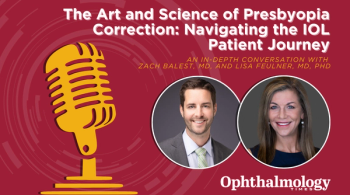
Understanding the surgical learning curve
We can all become true experts by channeling the passion for ocular surgery, according to Uday Devgan, MD, FACS.
The path to learning ocular surgery is a long and challenging one, but it is enjoyable and worth the investment to bring sight to our patients. True success
During the years of residency and fellowship training, basic surgical skills are acquired relatively quickly and the fundamental techniques and procedures are learned. Because this part of the learning curve is the steepest, there is a frustration barrier that must be overcome to get your hands to do what you need. No one is born knowing how to suture with 10-0 nylon monofilament,
The blue line in our graph is the young doctor who cannot find the drive to push past the frustration barrier to become an ophthalmic surgeon. As such, this doctor will drop out of training, switch to a different medical specialty, or choose to be a medical ophthalmologist who does not perform surgery.
Completing residency training will allow the ophthalmologist to acquire a reasonable surgical skill set and to become a competent surgeon, but not to become a true expert with the highest level of surgical skill and judgment.
The red line in our graph is the surgeon who is able to get past the frustration barrier and become a competent surgeon. But the passion and the drive to be better, simply is not there. This doctor will be stuck in this zone of mediocrity forever and will simply do the techniques that were learned back in residency training. We have all seen the surgeons who continue to perform older, outdated procedures because that is what they learned decades ago and that is where their comfort level lies. The critical question to ask is, “Am I doing the best for my patients and am I giving the surgery that I would want to receive?”
Becoming a true expert requires the surgeon to have a passion for ocular surgery and then to continue to learn independently for many years to come. Much more will be learned in the years after residency and fellowship compared to during the formal training.
The green line in our graph is the expert surgeon who has the drive and determination to learn from every single case and consistently evolve surgical techniques over the years. This surgeon embraces the very difficult cases and prepares diligently for them. This surgeon has the passion to be the best and will maintain that passion for decades. This is the true expert.
There is an incredible amount to learn in the first few years in practice. Having senior colleagues and partners are helpful in providing mentorship both in and out of the operating room. A large portion of surgical success is pre-operative planning and discussions with patients, as well as post-operative management. Once we are able to push through this passion barrier, we will want to do more of the tough surgical cases because we will enjoy the challenge. And then finally, when we are widely considered master surgeons and true experts in the field, we will still keep up with learning from every surgery and further advancing our skills.
We can all become true experts by channeling the passion for ocular surgery. We must learn from each and every surgery that we perform. We need to keep up with the latest techniques and technologies through continuing medical education and collaboration with colleagues. We understand that our field keeps evolving and the way that we operate today may not be the preferred technique in the future.
When it comes time for me to have surgery on my body, be it cataract surgery, orthopedic surgery, or cardiac surgery, I want a true expert who has the passion to be the best. I’m sure you feel the same.
For the video and discussion for this article, please visit the link
Disclosures:
Uday Devgan, MD, FACS
E: [email protected]
Dr. Devgan is in private practice at Devgan Eye Surgery in Los Angeles and Beverly Hills. He is clinical professor of ophthalmology at the Jules Stein Eye Institute at the UCLA School of Medicine and Chief of Ophthalmology at Olive View-UCLA Medical Center. Dr. Devgan owns and runs CataractCoach.com, a free teaching website where a new article/video is posted every day.
Newsletter
Don’t miss out—get Ophthalmology Times updates on the latest clinical advancements and expert interviews, straight to your inbox.





























